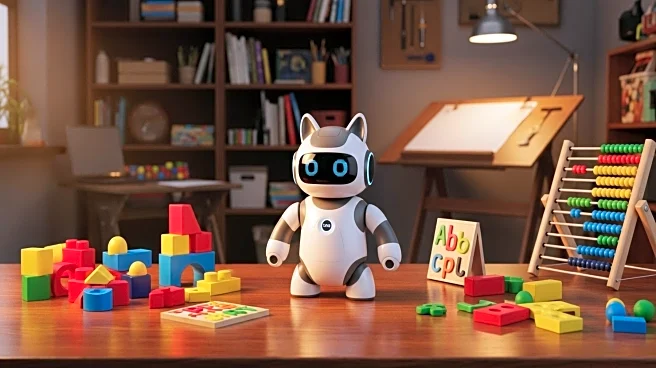What's Happening?
During Pulse NYC AI Week, an AI parenting workshop hosted by Build First gathered around 30 parents to discuss the impact of AI on modern parenting. The event highlighted diverse opinions on whether AI limits or expands opportunities for children. Parents working in tech shared experiences of using AI to connect creatively with their kids, while others expressed concerns about AI potentially hindering real-world skill development. The workshop also addressed screen time concerns, with some parents viewing AI as a tool for creative interaction rather than passive consumption. Discussions included the appropriate age for children to use AI, with varying opinions on its impact on creativity. The event underscored the need for more conversations about AI parenting, as some parents worry about being left behind in the AI era.
Why It's Important?
The integration of AI in parenting is significant as it shapes the upbringing of the first generation of AI-native children. This development impacts how children learn, interact, and develop skills, potentially altering traditional parenting methods. Parents in tech industries are finding new ways to engage with their children, suggesting a shift in family dynamics. However, concerns about screen time and creativity highlight the need for balanced approaches. The workshop reflects broader societal questions about AI's role in education and child development, influencing future policies and practices. As AI becomes more prevalent, understanding its effects on family life and child development is crucial for educators, policymakers, and parents.
What's Next?
Future discussions and workshops on AI parenting are likely to continue, addressing evolving concerns and opportunities. As AI tools become more integrated into daily life, parents may seek guidance on balancing technology use with traditional parenting methods. Companies like OpenAI and Meta may face increased scrutiny regarding youth safety and parental controls. Educational institutions might develop resources to help parents navigate AI's impact on child development. The conversation around AI parenting is expected to expand, influencing how families, educators, and policymakers approach technology in children's lives.
Beyond the Headlines
The ethical implications of AI in parenting are profound, raising questions about privacy, data security, and the influence of AI on children's development. As AI tools become more sophisticated, parents must consider the long-term effects on children's social skills, creativity, and mental health. The workshop highlights the need for ethical guidelines and policies to ensure AI is used responsibly in family settings. Additionally, the cultural shift towards AI-native children may redefine societal norms around education, play, and family interactions.









